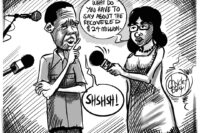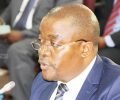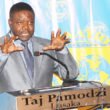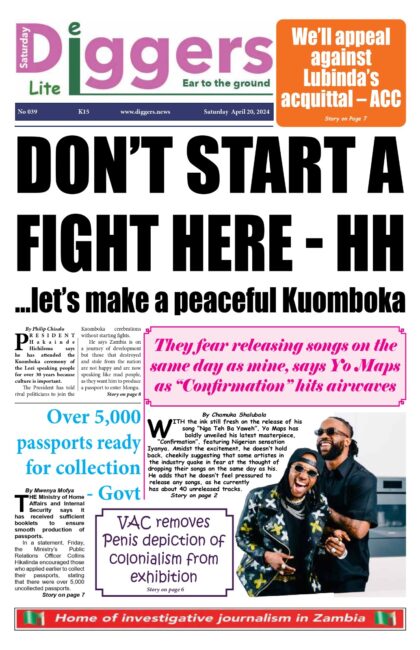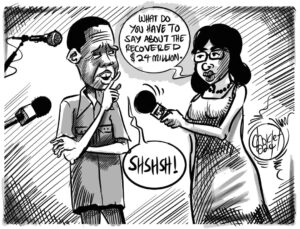Minister of Transport and Communications Brian Mushimba has insisted that Zambians will be the major beneficiaries of Zambia Airways which will be launched in partnership with the Ethiopian Airline.
But a former Zambia Airways pilot Alick Sakala says the airline only has a 10 per cent chance of succeeding.
Speaking when the duo featured on Hot FM’s ‘Hot Issue’ program on Wednesday evening, Sakala observed that although the idea of bringing the Ethiopian Airline on board as partners was attractive, Ethopians had their own vision.
“On one hand the idea of bringing in Ethiopian airlines does look to be fairly attractive because of their track record and so forth but if you look at their intentions, I’m going to give you a quote so that you can figure out and judge what is it that Ethiopian airways is trying to do. I will quote their group CEO, I think Mr [Tewolde] Gebremariam, I think after he had some talks with the government here, he was quoted that ‘in line with our vision 2025 hub structure for Africa, we are happy that we have had a successful meeting with the government’. In line with their vision. Take note that they have got their own vision,” Sakala said.
He wondered if government had its own independent vision for the airline.
“I can tell you what that 2025 vision for Ethiopia is, they are aiming to have 120 aircraft in their fleet, they are aiming to have more than 90 destinations, they are aiming to have at least 18 million passengers, they are aiming for a 720,000 tones of cargo by 2025. One of the things that they are going to use to do that is what exactly their CEO mentioned, hub structure. Our concern is, is Zambian airline going to be part of that Ethiopian vision or do we have our own vision for the airline?” he asked.
“On another level we have concerns about the airline being a parastatal. As you may know I’m the product of the parastatal system. Most of our generation were taught by the parastatal system, they gave us jobs and we are eternally thankful for that. But 30 years now, we feel that the old legacy, parastatal model, is basically outlived their usefulness. Like I said, the parastatal model is one which the world has seen that it does not work. 80 percent of airlines in the world are run by the private sector.”
Sakala revealed that the Malawian Airways, which was also in partnership with the Ethiopian airline, had never seen any dividends since its establishment in 2013.
He added that if the model was the same, the chances of the Zambian airline being successful was 10 percent or less looking at what had happened in Malawi.
“A few months ago, the Malawian MP swayed a review of that Ethiopian arrangement because Ethiopian [airline] is running Malawi. And they said ‘we need to review this PP arrangement with Ethiopian because we have not seen any dividends since this was established’, the arrangement was done I think 2013 and there has not been any dividends up to now. Now unless we are doing something different here, which I’m not aware of, when you ask me what are the chances of success, and we look at what’s happening in Malawi, I would say the chances are probably maybe 10 percent or less of success. If the model is the same unless there’s something else more convincing,” he said.
Sakala said for Zambia to save money in an airline business, there was need to establish an aircraft maintenance organisation.
“For you to make money in the airline, right from the beginning, what you need to do is make sure you have maintenance engineers and pilots who can fly the aeroplanes you want in your fleet. For you to save money, you must establish an aircraft maintenance organisation. We don’t have that right now. That automatically means that once the Ethiopians bring you their aeroplanes here, you have to pay them quite at a high rate which covers maintenance of the aeroplanes,” Sakala said.
“We run a program in our company similar to what the Ethiopians are going to bring here, 737, Dash 8, we found out that if they are going to charge Zambia the market rate which is called Aircraft Crew Maintenance and Insurance, because they have to do that, it’s about $3,200 every hour for the 737, it’s about $1200 every hour for the Dash 8. This is before you start paying for landing fees, navigation fees, salaries, so that tells you that the arrangement of bringing in aircraft you’d cannot maintain won’t work. Which means right from the beginning government is going to have to subside the operation right from the beginning. Unless the Ethiopian are not charging their market rate. If they are not, may be there’s a chance maybe it can work.”
Sakala observed that after fuel, maintenance had the next highest expenditure in an airline business.
“After fuel, maintenance has got the next highest expenditure in an airline. As a matter of fact just for an average airline that’s probably doing it’s own maintenance, you will find that 30 percent of expenses are in maintenance. Where you have a contract with an airline managing you, one of their main sources of income will be maintenance. Mostly likely they will not allow you to do your own maintenance and this is world wide. The beauty of having aeroplanes that you can maintain yourselves is that you are going to cut down on those costs. Those are some of the things that we are concerned about,” said Sakala.
But Mushimba assured that government’s model of partnership with the Ethiopian Airline was totally different from any other model which that airline had entered into.
“Our model that we are entering into is totally different from any other model that Ethiopian airlines has entered into. He (Sakala) spoke about the vision that Ethiopian airlines has, they can have that vision, that’s fine. We don’t control them. They are a parastatal entity out of Ethiopia. We as the Zambian government have our own vision and our vision is to transform this country into a transport and communications hub. If somebody who is good at running a national airline and has a vision and his vision matches with our vision, there is collaboration there. There’s no competition, there’s no erosion of any competences, it’s actually a good match that you can go for,” Mushimba said.
He said the airline would be profitable because they would not buy any planes which could not be maintained by their people.
“The equipment is not the equipment the captain was talking about. We are not getting any Dash 8 from Ethiopian airways. We have in mind a type of equipment, a table prop that can be used domestically to grow the market and the way we are going to maintain that and who is going to operate that, we have looked into all that. We are not going to get a plane that can’t be maintained by the people that we have or the people that can access in the region. All those things are things that have been thought through to make sure that we create a situation where the national airline is going to be successful in the shortest possible time. This national airline will be profitable,” he said.
“When we were deliberating on starting the national airline, obviously maintenance costs just like the type of equipment, because the type of equipment drives the type of maintenance, we took all those into consideration and the choice of the partner that we have chosen, Ethiopian airlines, is that partner who understands maintenance. But since Zambia airways is going to be independent, though the ownership is between the two, it’s going to look at where it’s optimal and economical to do the type of maintenance they must do on the equipment.”
And Mushimba said Zambia’s vision and objectives were different from what the Malawians wanted to achieve.
“The partnership we have entered, let’s not use the Ethiopian Malawian partnership here. Because we looked at that partnership and we knew from the start that as Zambia, our vision and our objective where totally different from what the Malawian’s wanted to achieve. We have our own dreams, objectives. We are in total control of this for the benefit of Zambia and for the benefit of Zambia airways and Zambians,” said Mushimba.
“When Zambia Airways starts, the benefits will accrue to the Zambian people, not to anyone else including the partners.”




